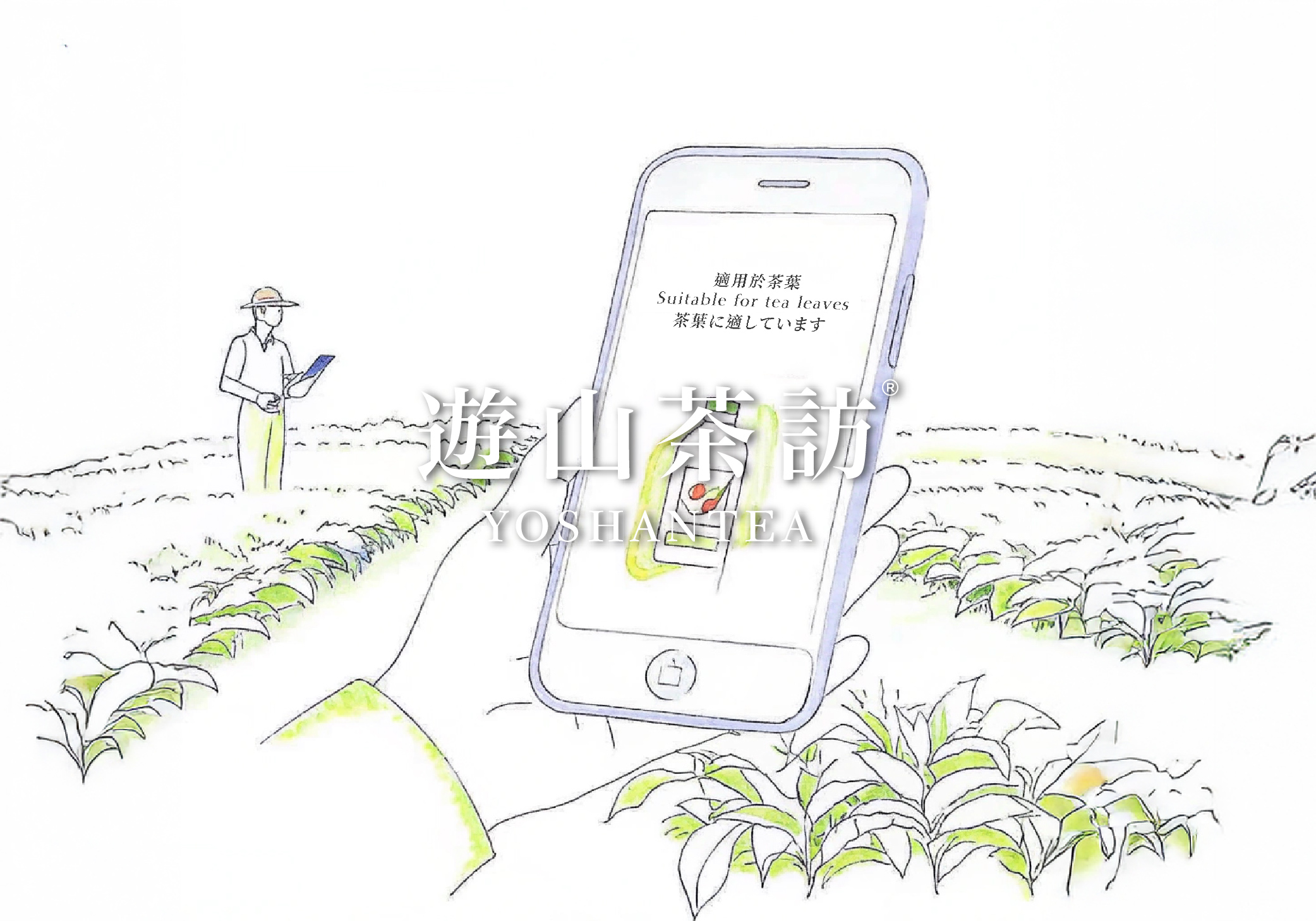Why Is Pesticide Management for Tea So Important?
Tea is a globally consumed beverage,and countries have strict regulations on pesticide residue
standards (MRLs – Maximum Residue Limits).
- Food Safety: If tea farmers misuse banned pesticides, it may cause health concerns and erode
consumer trust.
- Export Markets: Each country has different MRL standards; even small mistakes can lead to product
rejection.
- Sustainable Tea Industry: Using legal pesticides helps maintain healthy tea gardens and ensures
long-term, stable production.
How to Verify If a Pesticide Is Legally Approved for Use on Tea?
How to Use the Pesticide Barcode Search System
Taiwan’s Ministry of Agriculture offers the “Pesticide Barcode Search System” to simplify
thechecking process for tea farmers:
1. Scan the barcode on the pesticide bottle
2. The system displays the crops the pesticide can be used on
3. If “tea” is listed, the pesticide is approved for tea use
Official link: Pesticide Barcode Search System
https://demo.twgo.asia/pesticide-query/liff/#/scan
Use LINE’s “Pest and Disease Consultation Assistant”
Tea farmers can also use the official LINE account to check via their smartphones quickly and conveniently.
Steps:
- Open the LINE app
- Search for “病蟲害諮詢小幫手” (Pest & Disease Assistant)
- Scan the barcode
- Check the list of approved crops
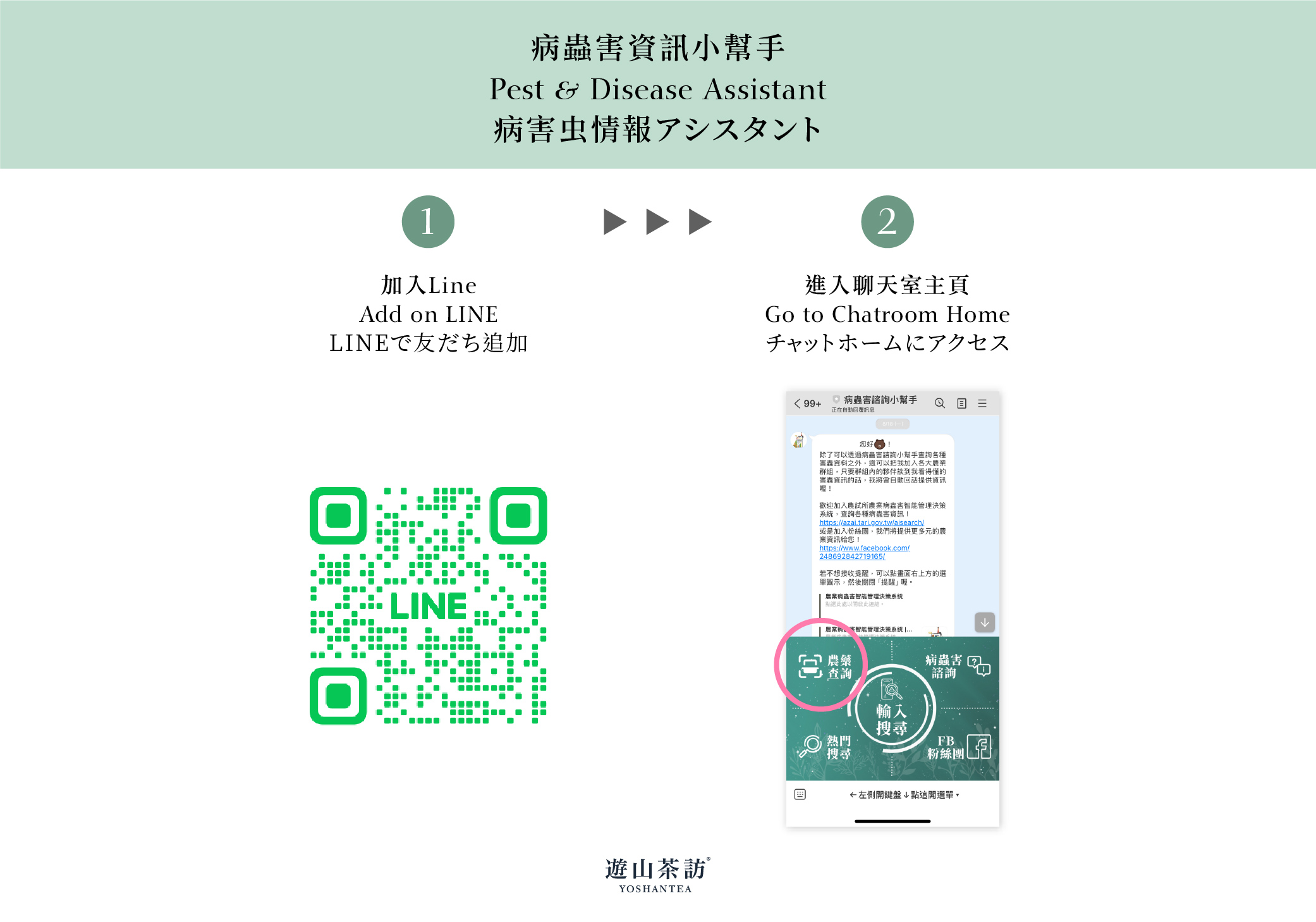
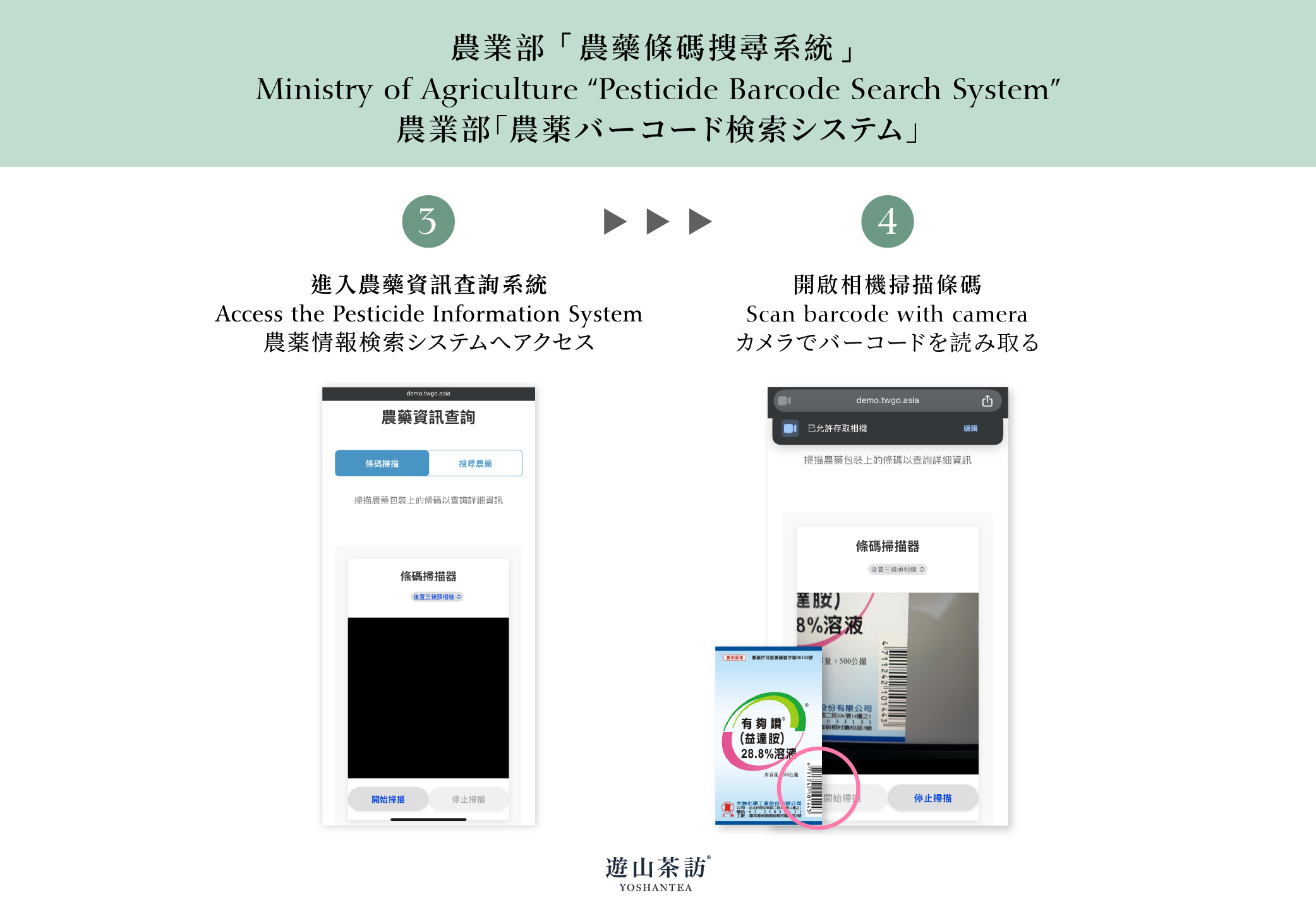
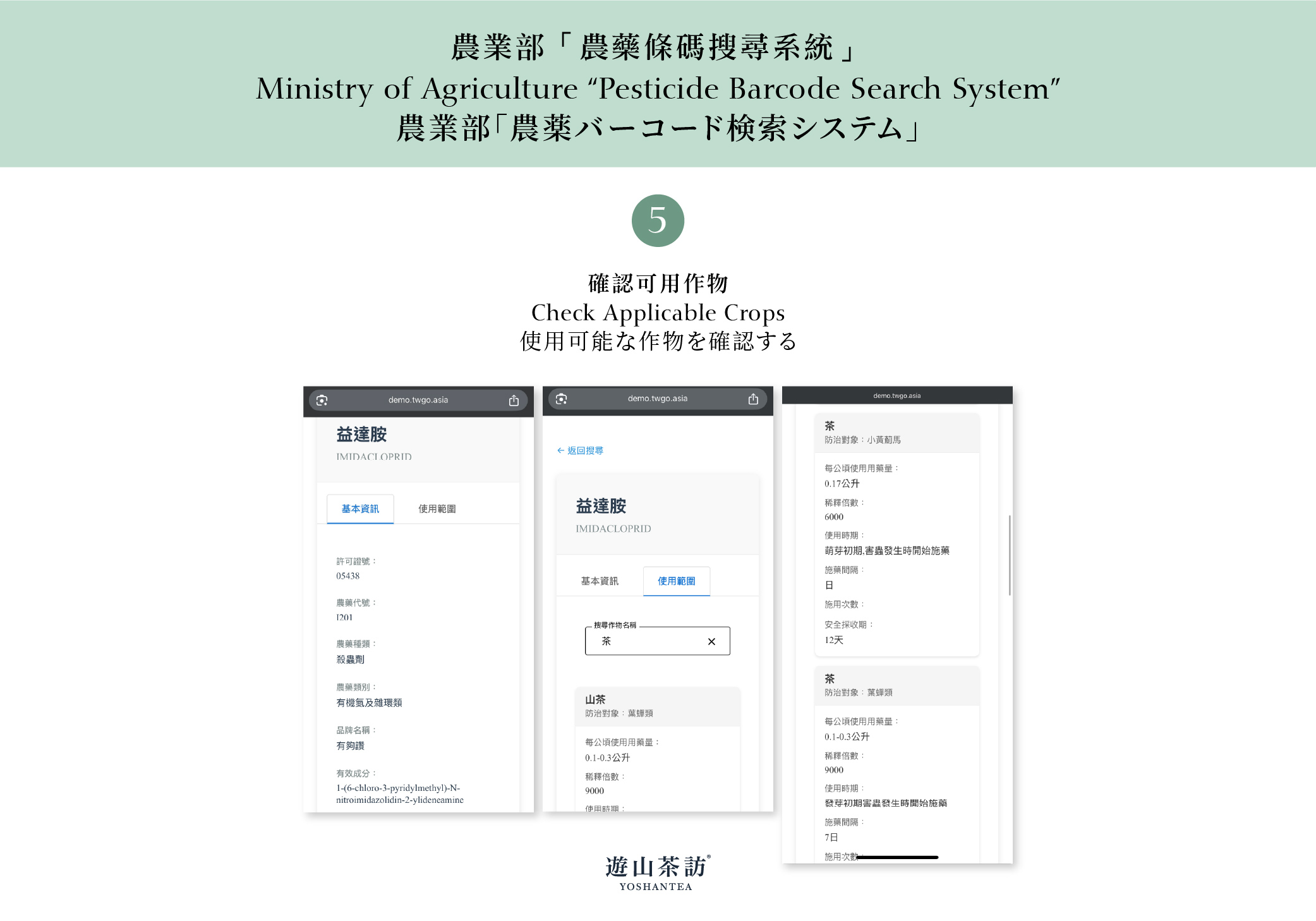
What If the Pesticide Can't Be Found?
If the system shows “No data found” after scanning, it means the pesticide is banned.
Example: Chlorpyrifos (陶斯松) has been completely banned and cannot be found in the system.
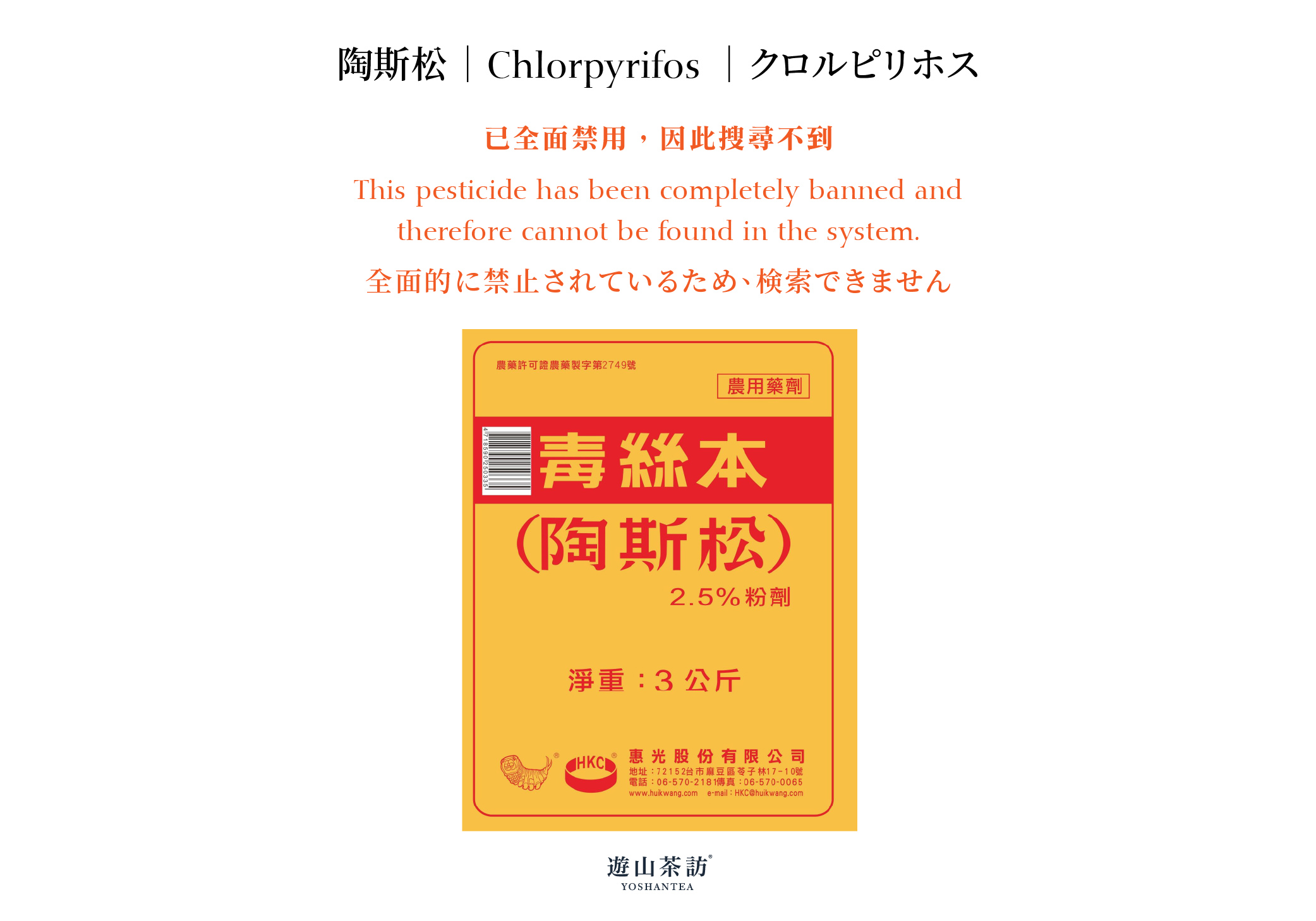
Recommended Pesticides for Tea vs. Export Restrictions
Taiwan publishes its own list of recommended pesticides for tea,
but if you’re exporting, the destination country’s standards must be followed.
The differences between countries can be huge. Here are some examples:
Afidopyropen
- Taiwan: 2 ppm
- Japan: 0.01 ppm
Fluopyram
- Taiwan: 5 ppm
- Japan: 0.01 ppm
Carbaryl
- Taiwan: 2 ppm
- Japan: 0.01 ppm
- South Korea: 0.01 ppm
Fenvalerate & Esfenvalerate
- Taiwan: 5 ppm
- China: 0.1 ppm
- Japan: 1 ppm
- Australia: 0.05 ppm
Imidacloprid
- Taiwan: 10 ppm
- China: 0.5 ppm
Dinotefuran
- Taiwan: 10 ppm
- South Korea: 0.01 ppm
These numbers show that while some pesticides are legal in Taiwan, they may exceed limits in countries like Japan or South Korea. Farmers must be cautious.
How Should Tea Farmers Choose Safe Pesticides?
Strictly Follow the Approved Pesticide List
Always use pesticides approved by the Ministry of Agriculture and verify legality with the barcode system.
Check the MRLs of Export Markets
If exporting tea, check the MRLs of the destination country to avoid rejection for non-compliance.
Avoid High-Risk Pesticides
Pesticides like Afidopyropen, Fluopyram, Carbaryl, and Dinotefuran have very low international limits. Farmers are advised to avoid them and consider safer alternatives.
Frequently Asked Questions (FAQ)
Q1: Does the Pesticide Barcode System cost money?
A1: It’s completely free and works on any smartphone.
Q2: What if the barcode doesn’t scan or shows no result?
A2: It means the pesticide is not approved. Do not use it.
Q3: How can I test tea for pesticide residues?
A3: You can send samples to certified pesticide residue testing labs. Services are available at farmers’ associations and agricultural research centers.
Q4: Do I need to worry about export standards if I sell only in Taiwan?
A4: If your product is for local sale only, follow Taiwan’s standards. But if you export, you must meet the target country’s standards.
Q5: Are any pesticides completely banned?
A5: Yes. For example, high-toxicity pesticides like Chlorpyrifos are fully banned.
Q6: Does the list of recommended pesticides change?
A6: Yes. The Ministry of Agriculture updates it regularly. Farmers should stay informed.
Conclusion: Safe Pesticides Matter More Than Taste
Tea is more than a drink — it’s a symbol of culture and health.
When selecting pesticides, tea farmers should use the barcode system, follow legal regulations, and understand export standards.
Remember: No matter how delicious your tea is, if it fails pesticide residue tests, it won’t make it to international markets.
Let’s work together to safeguard the safety and future of tea.
#yoshantea #taiwantea #dongdingtea #oolongtea #teafacotry #FSSC22000 #safetea #pesticidemanagement #residueregulations #teafarming #mrlstandards #sustainableagriculture #exporttea
